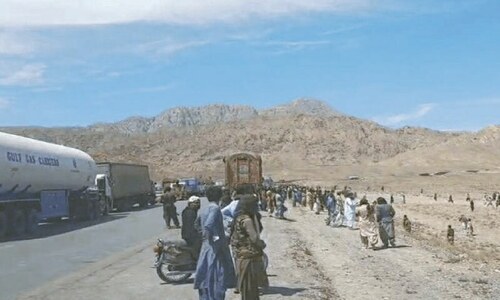ON Feb 8, a significant number of Pakistan’s people, mostly the young, threw out the selectors’ script and cast their vote for the PTI. Most knew that their mandate would not be respected, but chose to rebel against the establishment and its hangers-on anyway.
The vote-as-rebellion not only targeted our self-proclaimed holy guardians but also put paid to a large number of seasoned politicians known as ‘electables’. These historically powerful influentials may possess large amounts of agricultural land, real estate, industry or other economic capital. Their repeated appearances as MNAs and MPAs reflect deep entrenchment in daily life, especially as mediators between working people and everyday state institutions like the thana, katcheri and patwari.
By voting against these entrenched patrons, many young people demonstrated that politics can transcend the drudgery of life, and can, instead, be informed by ideological commitments. One need not agree with the premise that Imran Khan is a saviour or that the PTI is a genuinely anti-establishment force to recognise that those who made this choice on Feb 8 voted for an idea over entrenched forms of patronage.
One election does not signify an overhaul of our patronage-based order, nor does it displace the establishment that heads the political food chain. But it is important to consider how the vote-as-rebellion might be a stepping stone towards something more substantial. If there is to be a pathway out of the rapid downward spiral of state and society, we should recognise the historical roots of our predicament.
We must recognise the historical roots of our predicament.
Today’s patronage-based system was institutionalised during Zia’s dictatorship. Prior to the 1977 coup, mainstream politics here — like much of the world — was largely organised along ideological lines. The political left espoused socialism, anti-imperialism and ethnic-national claims, while the political right projected an Islamist ideology. The left was winning until Zia banned organised politics, student and trade unions, and reintroduced patronage as the name of the political game. I have previously called this the ‘politics of common sense’.
By sponsoring religious ideology and fusing it with a cynical form of patronage, Zia set the stage for mainstream political parties to become mere agglomerations of first-past-the-post constituency-level politicians who were more interested in sustaining themselves as patrons and less in debating ideas and policy.
This ‘politics of common sense’ was reinforced in the global arena by the neoliberal offensive, spearheaded by IFIs and Wall Street investors. So if local-level politics was reduced to thana, katcheri and patwari, with an ‘Islamic touch’, government policy was largely determined by IMF conditionalities on the one hand, and discretionary funds to MNAs and MPAs to facilitate private accumulation on the other.
The predominant exception to this ‘politics of common sense’, largely facilitated by the deep state, was the militant right-wing. Entities like the local Taliban and TLP are symbiotically linked to parliamentary Islamists, and thus patronage with an ‘Islamic touch’ survives. Ethno-nationalists and an emaciated left have continued to keep their flags flying but the local and global political economy has remained stifling.
Imran Khan and PTI emerged on the political scene claiming to be opposed to the established order. But in 2013 and 2018, the PTI acquired governmental power largely by mobilising entrenched electables. During this period, the party and its leader were also on the ‘same page’ as the establishment.
When relations soured after April 2022, many electables jumped ship. The party faced repression. But demographic change — two-thirds of Pakistanis are very young — and the PTI’s unmatched social media reach meant that its wider support base was not seriously eroded. And on Feb 8, a number of young people came out to defy the ‘politics of common sense’.
What happens from hereon is undetermined. Feb 8 only showed us that ordinary Pakistanis can swim against the pro-establishment tide. Remember that young people in the Baloch and other ethnic peripheries have been swimming against this tide for long. Left-progressives have also been challenging the IMF’s neoliberal dictates and various forms of class power. A genuinely anti-establishment and ideological politics cannot simply be based on the adulation of messiah-like figures. It must articulate a genuine political and economic alternative to the status quo. It certainly cannot be based on a slightly modified version of state ideology in which religion is used as a political weapon against the oppressed. A new ideological politics demands a new common sense that unites Pakistan’s youthful majority around the principle of collective liberation.
The writer teaches at Quaid-i-Azam University, Islamabad.
Published in Dawn, July 5th, 2024












































